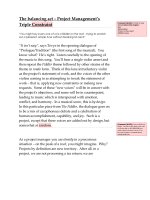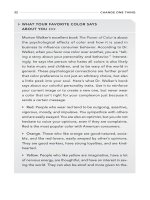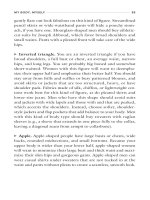Tim Cooks apology the good bad amp ugly
Bạn đang xem bản rút gọn của tài liệu. Xem và tải ngay bản đầy đủ của tài liệu tại đây (93.4 KB, 3 trang )
inc.com
/>apology.html
Tim Cook's Apology: the Good, Bad & Ugly
Eric Markowitz | Inc.com staff
Sep 28, 2012
Apple screwed up, and admitted it. Here are some of the highlights and lowlights of Tim Cook's 'We
fell short' letter.
Getty
Apple CEO Tim Cook at Apple's developers conference in San Francisco earlier this year.
Companies are composed of people, and people make mistakes. It's a simple syllogism, but it's often
easy to forget: companies even Apple, the world's largest can totally screw up, too.
Of course, that's what happened when Apple launched the newest iteration of its Maps app, and faced
an avalanche of disastrous reviews and negative attention.
But Tim Cook, Apple's CEO, chose not to sweep the negative press under the rug. Instead, he
confronted it, and issued an apology. That's certainly a good move, one all company leaders can learn
from.
Around this time last year, when Reed Hastings, the CEO of Netflix, attempted to introduce "Qwikster,"
a Netflix spin-off that would, essentially, just cost more money for customers, he addressed complaints,
abandoned the effort, and he, too, issued an apology. "I messed up," he wrote.
Cook's "We fell short" letter is a good instruction manual for how company CEOs can respond to a
public failure like a botched product launch, but we think it could be better. Should you find yourself in
Cook's shoes, this guide and simply saying "I'm sorry" might be all you need.
Here's Cook's letter and Inc.'s breakdown of its gaps:
To our customers,
At Apple, we strive to make world-class products that deliver the best experience
possible to our customers. With the launch of our new Maps last week, we fell short on
this commitment. We are extremely sorry for the frustration this has caused our
customers and we are doing everything we can to make Maps better.
Opener: It's good, but not great. Note the pronoun "we" instead of "I," and "our customers" insted of
"you." He's distancing himself from the product failure, and not taking full responsibility for it. This
weakens Cook's argument. Saying "I am extremely sorry," and "I am doing everything we can for you,"
would be more direct and personal.
We launched Maps initially with the first version of iOS. As time progressed, we
wanted to provide our customers with even better Maps including features such as
turn-by-turn directions, voice integration, Flyover and vector-based maps. In order to
do this, we had to create a new version of Maps from the ground up.
Explanation: OK, the paragraph confronts the reality of what went wrong and we sort of get a sense
for how and why Apple messed up, but why doesn't Cook just state the obvious: 'We wanted to do too
much.' Users would appreciate that kind of straightforward honesty. Like the preceeding sentences, it
lacks personal conviction and importantly twists the mistake into a promotion of product features.
There are already more than 100 million iOS devices using the new Apple Maps, with
more and more joining us every day. In just over a week, iOS users with the new Maps
have already searched for nearly half a billion locations. The more our customers
use our Maps the better it will get and we greatly appreciate all of the feedback we
have received from you.
Gratitude: Essentially, Cook is saying 'Don't give up on us!' And 'We're responding to your feedback!'
But he's also taking the opportunity to spin the failure into a rollout success story. And that insincerity is
obvious to anyone who's tried Apple Maps and had a bad experience (or just read his letter).
While we're improving Maps, you can try alternatives by downloading map apps from
the App Store like Bing, MapQuest, and Waze, or use Google or Nokia maps by
going to their websites and creating an icon on your home screen to their web app.
Everything we do at Apple is aimed at making our products the best in the world. We
know that you expect that from us, and we will keep working non-stop until Maps lives
up to the same incredibly high standard.
Closer: This is the best part of Cook's letter. He knows customers will be downloading other map apps
and figuring out hacks to avoid using the native Maps app so he's helping them out. Stating the
obvious even if it means directing users to Apple Maps arch rival Google is a positive. (He's also slyly
making readers aware of an array of options, so they don't all jump ship to Google Maps at once.)
What do you think? Did Cook's apology address customer frustrations?
Eric Markowitz reports on start-ups, entrepreneurs, and issues that affect small
businesses. Previously, he worked at Vanity Fair. He lives in New York
City. @EricMarkowitz









